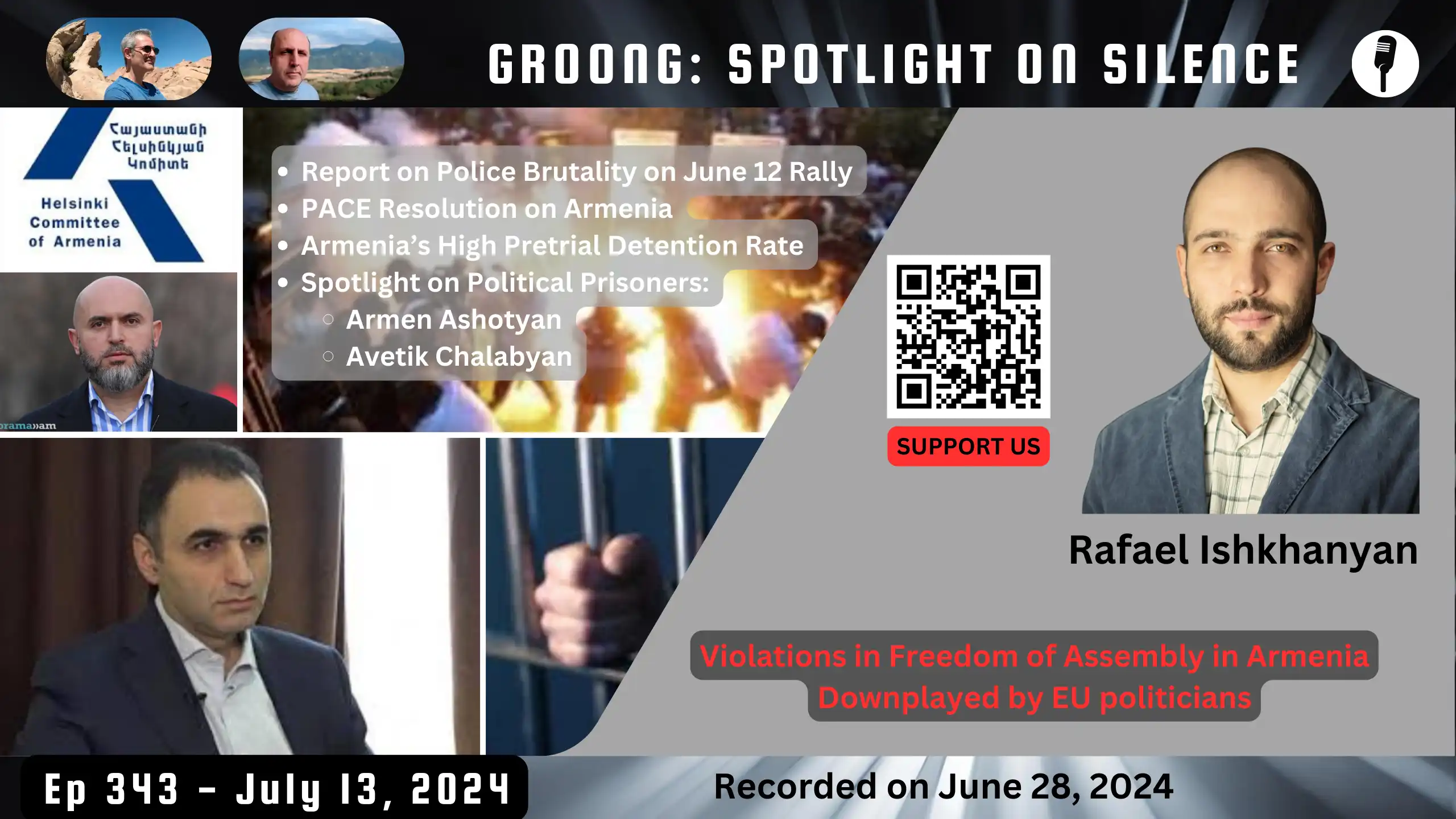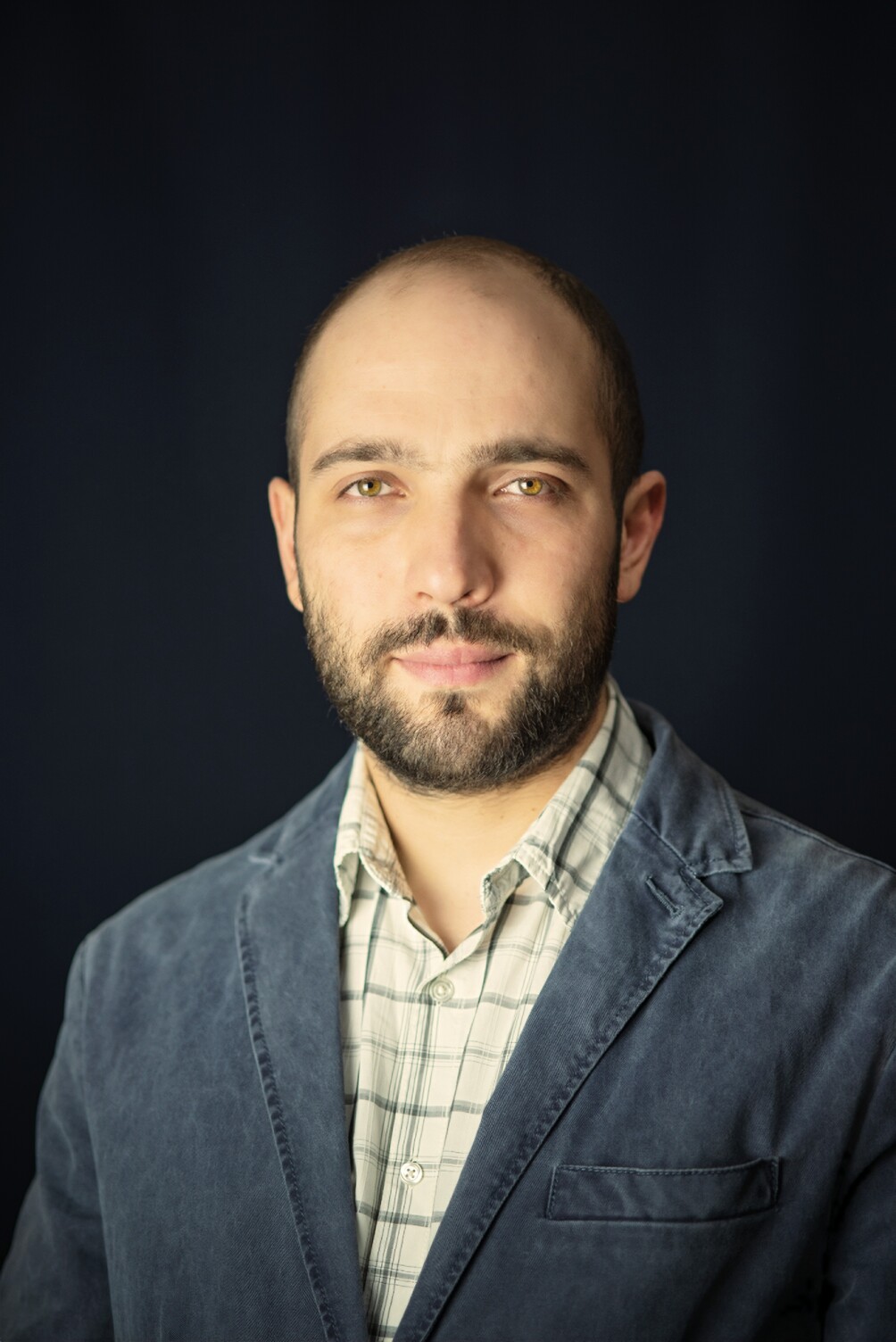Rafael Ishkhanyan - Report on Police Brutality on June 12, Armenia High Pretrial Detention Rate, Avetik Chalabyan | Ep 343 - July 11, 2024 [EP343]
Posted on Saturday, Jul 13, 2024 | Category: Armenia, Spotlight on Silence, Political Prisoners | Series: SOS, video
Groong Links:
Topics:
- Report on Police Brutality on June 12 Rally
- PACE Resolution on Armenia
- Armenia’s High Pretrial Detention Rate
- Spotlight on Political Prisoner: Avetik Chalabyan
Guest:
Episode 343 | Recorded: June 28, 2024
Show Notes
Police Brutality and Freedom of Assembly
Report on Police Brutality on June 12 Rally
So the ACPR Ad Hoc report on June 12 is out. On that day, the Pashinyan regime clearly showed that they’re ready and willing to use disproportionate force to suppress protesters. Up to a hundred people sought medical attention after the police lobbed dozens of stun grenades at the protesters, many of them were severely injured.
Among the injured were several journalists, including Abraham Gasparyan from ABC Media. RSF (Reporters Without Borders) criticized the Armenian police for “deliberately” targeting journalists.
NOTE: It’s important to highlight that the stun grenades that were used are reported to produce noise greater than 170dB, which can instantly cause permanent hearing damage.
Rafael, you were there on the scene that day, monitoring the protests.
Questions:
- Can you tell us what happened that day? How did everything start?
- Was the police use of force proportional, or even justified?
Stun Grenades
Your report shows that some police officers were trying to maintain order, while others were agitating and fighting with protesters.
Then you also describe how, when the first stun grenades were employed, the situation was tense but not violent and it seems that the police initiated the violence.
Questions:
- Can you tell us more about why the police found it necessary to use stun grenades?
- What type were they? How many were deployed?
- Was the use justified by policies and regulations?
PACE Resolution on Armenia
A PACE report on Armenia’s honoring of its obligations and commitments was just released.
The report begins with: “The Parliamentary Assembly commends Armenia for its continuous commitment to democratic development in spite of the considerable security challenges it is facing”
In an interview, Kimmo Kiljunen, one of the co-rapporteurs said that they’re assessing Armenia’s commitments to the EU “positively”, but said that there were a few “internal hiccups”.
Meanwhile, the other co-rapporteur, Boriana Åberg, in her own interview, said that despite the war, the refugees from Artsakh, and challenges around the “peace agreement”, Armenia has been able to reform the electoral system as well as increase the independence of its judiciary. The only concern she could name was that the political climate is polarized, appearing to also lecture the opposition for being too radical.
Questions:
- What is your overall assessment of the report?
- What “internal hiccups” is Kiljunen referring to?
Shameful paragraph 4: “The Assembly expresses its relief that clashes (in Sep 2023) with the police forces during these events brought no casualties, in sharp contrast with the 10 deaths that had occurred in March 2008”
Questions:
- Is comparison with March 1 fair?
- Because it seems like Pashinyan’s government basically wrote some of the report for PACE and handed it to them. Paragraph 4 is the most basic Pashinyan propaganda.
Judicial Independence
In 2023 the Freedom House Armenia report wrote: “The judiciary lacks independence and is one of the least trusted public institutions in the country.”
The PACE report starts with: [paragraph] “15. The Assembly commends the reforms aimed at safeguarding the independence of the judiciary and notes with satisfaction the openness of the Armenian authorities to a genuine dialogue with the Council of Europe and their continued effort to improve the system of judicial governance in line with European standards”
But it also mentions that there’s “widespread perception” that the disciplinary procedures against judges are being abused.
The PACE report goes on to recommend that:
- The Ethics and Disciplinary Commission of the General Assembly of Judges should be reformed
- There should be restrictions for politicians from becoming members of the SJC
Questions:
- Did the report cover the issues with the Armenian judiciary adequately, in your opinion?
- NOTE: In the first installment of SoS, we talked about this.
Right To Peaceful Assembly
The PACE report starts with: [paragraph] “101. Respect for the right to protest and response of law enforcement to protests have caused concerns.”
The report then discusses Article 136 of the Armenian Criminal Code, which criminalizes “incentivized participation” in rallies, and which is against the spirit of European guidelines on Peaceful Assembly.
Interestingly the PACE report refers to Avetik Chalabyan’s case in paragraphs 103 and 104. Chalabyan himself noted this reference, adding that the Armenian Criminal Code was modified to add the unconstitutional Article 136, and added his voice to the ACPR and the Helsinki Committee of Armenia, urging authorities to get a second opinion from the Venice Commission.
Questions:
- What are your thoughts on Article 136? Is it unconstitutional?
- If you read between the lines, The PACE report seems to be saying that since Chalabyan’s case, the government has been using Article 136 against the opposition liberally. Is the government applying Article 136 appropriately?
Armenia Has 2nd Highest Pretrial Detention Rate
Armenia, due to social cohesion, is relatively crime-free. However, Armenia has the #2 highest rate of pretrial detentions (53%) in Council of Europe, which is one of the tools that Pashinyan punishes political opponents.
In other words, more people are in prison in pre-trial detention than those serving actual jail time as part of a criminal verdict.
Top pre-trial detention countries:
- Albania (55%)
- Armenia (53%)
- Luxembourg (49%)
- Switzerland (46%)
- The Netherlands (45%)
- Montenegro (42%)
- Northern Ireland (UK) (41%)

Data:
When we say political persecution, we keep thinking about the standard cases of political imprisonment.
Questions:
- What can you say about pretrial detention?
Spotlight on Prisoners/Cases
Armen Ashotyan
One of Pashinyan’s most prominent political opponents.
Charged in 2022 with abuse of official position and money laundering while holding the position of the Chairman of the Board of Trustees of YSMU named after Mkhitar Heratsi, as well as the Minister of Education and Science. Alleged to have “pushed” Rector Narimanyan to buy apartments from the “Tsovasar” hotel complex belonging to Ishkhan Saghatelyan’s family on behalf of the university. Initially released on bail with signature not to leave the country.
In June 15, 2023, re-arrested for violating the terms of his bail by allegedly attempting to “influence the investigation” by offering the services of his lawyers to the witnesses. Ashotyan’s attorney Tigran Atanesyan denies attempts to influence the preliminary investigation and reports that the apartments purchased on behalf of the medical university are still on the university’s balance sheet, and their market value has even increased, which excludes money laundering and other accusations.
None of the intermediaries accused of taking part in this crime are under arrest, only Ashotyan is, highlighting the political nature of this case. Conditions of his detention (strict restriction of contacts/visitation) also indicative of political motivations (compare with fmr. Minister of Economy Vahan Kerobyan suspected of corruption, but received a house arrest).
Detention: June 15, 2023 - Present (~12+ months so far)
Avetik Chalabyan
Avetik Chalabyan has been a prominent opposition politician, and has been a scathing critic of Pashinyan, as well as his proposed constitutional rewrite, education reforms and more. In 2022 he was charged with “motivating students materially” to participate in opposition rallies. In 2023 he co-founded the Hayaqve legislative initiative. Ultimately a guilty verdict was issued in Dec. 2023, banning Chalabyan from organizing & participating in assemblies for 2.5 years.
Freedom of assembly, as well as other human rights, are constitutional rights that can only be restricted when the following three norms are simultaneously satisfied:
- to be provided for by law
- to be necessary in a democratic society
- to pursue a legitimate goal
Detentions: May 14, 2022 - July 27, 2022, July 31, 2022 - August 31, 2022 , Released on AMD 15M bail (~4 months total)
Status: Currently under appeal.
Details: Joint Report by Helsinki Committee of Armenia and Armenian Center for Political Rights
Questions:
- Tell us more about Avetik Chalabyan, is he a political prisoner in his own country?
Documents:
- Report: The honouring of obligations and commitments by Armenia
- Armenia: while welcoming the electoral reforms implemented, PACE regrets the excessive polarisation of the political climate
- OSCE / ODIHR GUIDELINES ON FREEDOM OF PEACEFUL ASSEMBLY (3rd ed) \
Interviews:
- PACE’s Boriana Åberg on the honouring of obligations and commitments by Armenia
- PACE’s Kimmo Kiljunen on the honouring of obligations and commitments by Armenia
Wrap-up
That’s our Spotlight on Silence, we hope you found it helpful. We invite your feedback and your suggestions, you can find us on most social media and podcast platforms.
Thanks to Laura Osborn for the music on our podcasts.
Guests

Rafael Ishkhanyan
Rafael Ishkhanyan is a lawyer specializing in human rights, particularly freedom of assembly and expression. He coordinates the monitoring of peaceful assemblies at the Helsinki Committee of Armenia and is a member of the ODIHR Panel of Experts on Freedom of Assembly and Association. In 2023, together with colleagues, he co founded the Armenian Center for Political Rights, a watchdog organization focusing on detecting, responding to, and preventing political persecution and safeguarding political rights.
Hosts

Hovik Manucharyan
Hovik Manucharyan is an information security engineer who moved from Seattle to Armenia in 2022. He co-founded the ANN/Groong podcast in 2020 and has been a contributor to Groong News since the late 1990s.
Disclaimer: The views expressed by Hovik Manucharyan on the ANN/Groong podcast are his own and do not necessarily reflect the opinions of his employer or any other organization.

Asbed Bedrossian
Asbed Bedrossian is an IT professional, and for years oversaw the central IT enterprise infrastructure and services at USC. His decades of experience spanned across IT strategy, enterprise architecture, infrastructure, cybersecurity, enterprise applications, data center operations, high performance computing, ITSM, ITPM, and more.
Asbed founded the Armenian News Network Groong circa 1989/1990, and co-founded the ANN/Groong podcast in 2020.